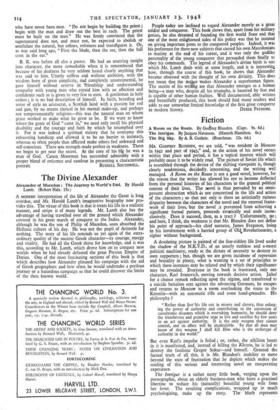The Divine Alexander
Alexander of Macedon : The Journey to World's End. By Harold Lamb. (Robert Hale. 15s.) A MODERN interpretation of the life of Alexander the Great is long overdue, and Mr. Harold Lamb's imaginative biography now pro- vides this. The virtue of this book is that it treats his life in a realistic manner, and strips it of many legends. Mr. Lamb also has the advantage of having travelled over all the ground which Alexander covered in his great march of conquest to the Indus. Alexander, although he was the son of Philip of Macedon, soon absorbed the Hellenic culture of his day. He was not the pupil of Aristotle for nothing. The story of his life reminds us yet again of the extra- ordinary quality of the ancient Greek character—its courage, energy and vitality. He had all the Greek thirst for knowledge, and it was this, according to Mr. Lamb, which drove him on to conquer new worlds when he had already defeated the great Persian Empire of Darius. One of the most fascinating sections of this book is that which describes how Alexander planned his campaign with the aid of Greek geographers and how often he would undertake a perilous journey or a hazardous campaign so that he could discover the limits of the then known world. People today are inclined to regard Alexander merely as a great soldier and conqueror. This book shows that, apart from his military genius, he also dreamed of founding the first world State and that one of the most enlightened sides of his policy was that he insisted on giving important posts to the conquered peoples. Indeed, it was his preference for these new subjects that caused his own Macedonians to mutiny at the end of his career, and it was only the godlike personality of the young conquerer that persuaded them finally to obey his commands. The legend of Alexander's divine birth is one which Mr. Lamb deals with at some length, and it is interesting how, through the course of this book, he shows that Alexander became obsessed with the thought of his own divinity. This does not mean that the au ;,or makes Alexander a superhuman figure. The merits of his wri;ii g are that Alexander emerges as a human being—a man who, despite all his triumphs, is haunted by fear and is capable of other human frailties. Well documented, ably written and beautifully produced, this book should find many readers and adds to our somewhat limited knowledge of the first great conqueror






























 Previous page
Previous page